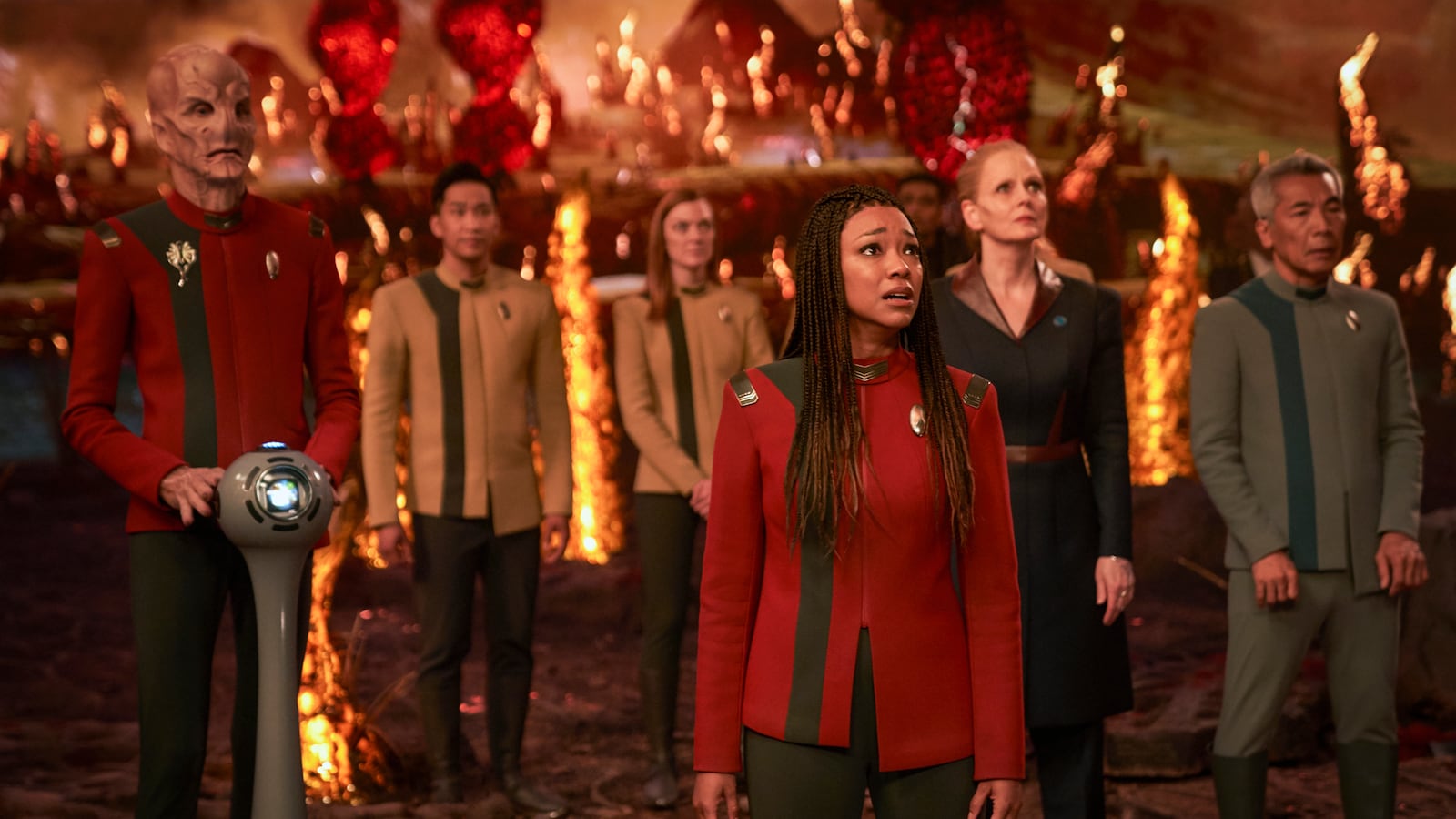It’s been a hot minute since Star Trek: Discovery last graced our screens. When the fifth and final season starts April 4 on Paramount+, it will arrive two-and-a-half years after the debut of Season 4. That’s a long gap for such a forgettable season of Star Trek. As The Daily Beast Obsessed’s resident Star Trek tragic—they won’t let me leave; please send help—the unenviable duty of reminding everyone what happened on Discovery Season 4 in preparation for Season 5, unfortunately, falls to me.
It goes like this: It’s the 32nd century, and a gravitational anomaly is on its way to Earth—except it’s not an anomaly; it's an alien mining device. Burnham and the crew of the USS Discovery go and ask the aliens really nicely to stop mining and then everyone goes home and tries not to think about the billions of people it killed. That may seem a gross oversimplification of 13 hours of television, but it isn’t. Seriously—that’s it.
I need to eke out 800 more words out of this, however, so: Did you know lobsters can theoretically live forever, if nothing eats them and they don’t get stuck in their shells?

Doug Jones as Saru, Wilson Cruz as Culber, David Ajala as Book, and Sonequa Martin Green as Burnham.
Michael Gibson/Paramount+Interesting stuff, right? Certainly more interesting than Season 4 of Discovery. If that brief rundown sounds like that should be, maybe, one episode of Star Trek instead of 13, you’re right. But this is Discovery; it needs an overarching plot so this particular idea is spread over multiple slices of bread until all semblance of plot and pacing is functionally invisible.
If you really want to get into it, here goes: In Season 4, we join Michael Burnham (Sonequa Martin-Green) and her beau, Book (David Ajala), on what amounts to a Federation outreach program. They’re delivering the Federation’s newly-acquired dilithium, before Book heads home to Kweijan for an alien bar mitzvah. Shortly after, it’s destroyed before his eyes by a strange anomaly. This sets up the big theme of Discovery Season 4: therapy. Everyone gets therapy this season, even the ship’s computer (Annabelle Wallis), which is sentient now, gets therapy.
Book is left to come to terms with his grief, because the Federation has a new president, Laira Rillak (Chelah Horsdal), and Michael Burnham, one-time mutineer—and cause of over a hundred million Federation deaths—is not happy. As Ni’var, the reunified Vulcans and Romulans, plans to rejoin the Federation and help tackle the anomaly, now christened the DMA, Burnham is forced to tag along with the galactic politics.
This also introduces us to President T’Rina (Tara Rosling) who we quickly learn has Kelpian Fever, baby! This is the most interesting part of this season, because this Vulcan is down bad for Saru (Doug Jones) and will not admit it. We also get a multi-episode arc featuring Gray (Ian Alexander) getting a new android body, while Adira (Blu del Barrio) has to contend with how that changes their relationship—helped by more therapy—before both mostly disappear from the season.
New face Ruon Tarka (Shawn Doyle) has an idea of how to stop what he thinks is, in fact, an alien weapon: space-nuke it. It’s illegal but Tarka doesn’t care. He’s too cool for school, even when school says no nukes. This will be important later, but for now it’s time to debate whether it’s okay to space-nuke aliens.
It looks like things might get moving towards said aliens, but Burnham’s mother Gabrielle (Sonja Sohn) arrives because a rogue Qowat Milat (those pointless sword elves from Picard Season 1) has stolen some dilithium and it’s time to hunt them down. After some swordfights, it turns out the rogue space ninja stole the dilithium to save the Abronians—some random aliens who are there… for a bit.
Back on Discovery, everyone gets some time off and therapy from Doctor Culber (Wilson Cruz), who also gets therapy from another dude entirely because everyone telling him about their problems has him stressed. Book and Tarka, however, are done with therapy. They’re off to blow up the DMA, but we’ve still got five episodes to go, so that doesn’t work. Now, they’re off to find a new way to blow it up. Meanwhile, Discovery is jetting off to find the aliens who control the DMA, dubbed the 10-C, to negotiate. Both presidents come along— Rillak because it’s a political and diplomatic mission, and T’Rina to awkwardly eye-fuck Saru in Discovery’s corridors.

Sonequa Martin-Green as Burnham and Doug Jones as Saru.
Marni Grossman/Paramount+Then, Discovery does some pushing the boundaries of space travel (which is mostly sparks and actors wobbling in their chairs), has a quick away team acid trip, and 11-and-some-odd hours in, we finally see who’s behind the DMA. They’re big space whale insect things. At this point, the series basically becomes Arrival, as the crew of Discovery use math to communicate with the giant super-aliens behind the force-field of their shuttle bay because they are proper nerds. At the same time, we learn that the DMA is on its way to Earth and Ni’var.
Admiral Vance (who we all love, because he’s Oded Fehr) begins evacuating, helped by Tilly (Mary Wiseman) who is now teaching at Starfleet Academy, while fending off space debris pushed at Earth by the DMA. Despite the apparent time pressure, Burnham and company spend some time patting each other on the back while Book and Tarka rock up. But Book has second thoughts when he learns it might not be so safe … to blow things up.
Vance finally breaks off evacuation efforts as things get too dangerous, staying behind with Tilly to protect Earth. At which point he produces two flasks of whiskey to celebrate their impending death. That the dude in charge of Starfleet is packing two flasks is never addressed.
The 10-C briefly gets angry at Book and Tarka’s intervention and it looks like Book dies in the resulting conflict. But no, the 10-C saved him. Only Tarka, who wasn’t receptive to therapy this season, bites it. The 10-C stop mining, Earth (and Vance and Tilly) are saved, Saru and horny space president hold hands, Book gets some community service, and everything ends up back where we started.
It’s sad that Discovery is ending, but it’s sadder how much Season 4 represented a downfall for a series that weathered sad nerds getting upset because Klingons got better make-up in order to revive the series for new audiences. For its first two seasons, it maintained a careful balance between the humanity of Star Trek and the more action-oriented pace of the most recent Star Trek movies. Even Season 3, which saw Discovery move to the far future, was a smart and effective shift after Season 2 had explored old ground.
Yet, it feels apt that Season 5 will be the show’s last, given how much Season 4 felt like the backwash of Picard’s love of references and name dropping, as opposed to the more interesting beginnings of Discovery, the suggestion that Elon Musk is a scientific luminary notwithstanding. If you’re one of the people that missed, or justifiably forgot, Season 4, however, now you know you’re not missing anything because it adds literally nothing to the series. Now, apropos of nothing, time to get some therapy—no idea what gave me the idea.






